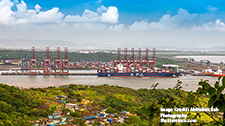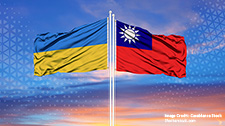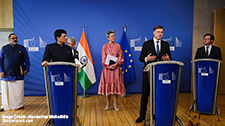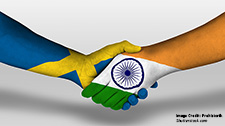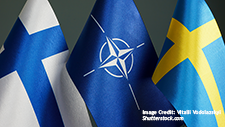
Jagannath P. Panda
Head of the Stockholm Center for South Asian and Indo-Pacific Affairs (SCSA-IPA) and Editor
Dr. Jagannath Panda is the Head of the Stockholm Center for South Asian and Indo-Pacific Affairs (SCSA-IPA). He is also the Executive Editor for ISDP.
In addition to his primary appointment at ISDP, Dr. Panda is a Professor at the Department of Regional and Global Studies at the University of Warsaw. He is also the Director for Europe-Asia Research Cooperation at the Yokosuka Council on Asia-Pacific Studies (YCAPS); and a Senior Fellow at The Hague Centre for Strategic Studies (HCSS) in the Netherlands.
Prof. Panda has testified to the US-China Economic and Security Review Commission at the US Congress on ‘China and South Asia’.
As a senior expert on China, East Asia, and Indo-Pacific affairs, Prof. Panda’s current research focuses on India’s relations with major Indo-Pacific powers (China, Japan, South Korea, the EU), China-India Relations, China and NATO, and the EU in Indo-Pacific.
He is the Series Editor for Routledge Studies on Think Asia. Dr. Panda is a Contributing Editor for The National Interest (Washington DC) and an Author at The Diplomat. He is an Advisor to the Central European Institute of Asian Studies (CEIAS), and is also the Member of the Editorial Board of various international journals such as the Journal of Asian Public Policy (JAPP: Routledge) and The Korean Journal of Defense Analysis (KIDA).
Prof. Panda has a column titled “Asia’s Next Page” with Japan Forward, and is a keen follower of Chinese, Japanese and Korean affairs including Indo-Pacific power politics. He has been a Korea Foundation Fellow (2018) and Japan Foundation Fellow (2018). Dr. Panda has written for The National Interest, China Brief (Jamestown Foundation), The Diplomat, Nikkei Asia, 38 North (Stimson Centre), Asia Times, The Japan Times, The Japan Today, The Korea Times, The Korean Herald, The Diplomat, Chaillot Papers (EUISS), South Asian Voices (Stimson Centre), The Asan Forum, East Asia Forum, PacNet Commentary, The Strategist (ASPI), Korea On Point, Asia-Pacific Bulletin, The Independence (UK), The Strait Times (Singapore), The Hindu, The Indian Express, The Tribune and The Pioneer among many other international forums.
Prof. Panda is the author of the book India-China Relations (Routledge: 2017) and China’s Path to Power: Party, Military and the Politics of State Transition (IDSA & Pentagon Press: 2010). His recent work includes Quad Plus and Indo-Pacific (Routledge: 2021); Scaling India-Japan Cooperation in Indo-Pacific and Beyond 2025 (KW Publishing Ltd. 2019), and The Korean Peninsula and Indo-Pacific Power Politics: Status Security at Stake (Routledge, 2020), India-Japan-ASEAN Triangularity (Routledge: 2022), and the Future of Korean Peninsula: Korea 2032 and Beyond (Routledge: 2021).
He has published in leading peer-reviewed journals like Asian Politics & Policy (Wiley), Journal of Asian and African Studies (Sage), Asian Perspective (Lynne Reiner), Journal of Contemporary China (Routledge), Journal of Indo-Pacific Affairs (JIPA), Journal of Asian Public Policy (Routledge), Georgetown Journal of Asian Affairs (Georgetown), Strategic Analysis (Routledge), China Report (Sage), Rising Powers Quarterly, Fletcher Security Review, Indian Foreign Affairs Journal (MD Publication), The Journal of Indian and Asian Studies (World Scientific), East Asia Forum Quarterly (EAF), Portuguese Journal of International Affairs (Euro Press) etc.
Prof. Panda enjoys several adjunct affiliations in various think-tanks/institutions in Asia/Indo-Pacific. He holds a position of International Research Fellow at the Cannon Institute for Global Studies (CIGS) in Japan; a Senior Research Fellow at the United Services Institution (USI) of India, New Delhi; a Senior Fellow at the East Asian Security Centre at Bond University, Australia; and a Senior Research Fellow at the Japan Forum for Strategic Studies (JFSS), Tokyo. He was a fellow at India’s premier think-tank, Institute for Defence Studies and Analyses (now, Manohar Parrikar-IDSA) for one and half-decade [2006-2022], and received his Ph.D. degree from the Jawaharlal Nehru University (New Delhi) in 2006-07.
X/Twitter (previously): @jppjagannath1
LinkedIn: Jagannath Panda | LinkedIn
Publications by Jagannath P. Panda
-
Jagannath Panda: “India’s INSTC Commitment Is Not Reliant on Western Endorsement”
Interview conducted by Ilya Roubanis, Caucasus Watch The International North-South Transport Corridor (INSTC) is a 7,200km mostly overland network stretching from India to Russia, via Azerbaijan and Iran, branching […]
-
Not Drawing a Parallel. Ukraine and Taiwan: An Indian Perspective
Russia’s war against Ukraine has not only had economic, diplomatic, and geopolitical repercussions, but also exaggerated the fear of accelerated conflicts in the Indo-Pacific, a region with several unresolved conflicts […]
-
Trade, Connectivity and Supply Chains in EU-India Relations
In the decade and a half since 2007 when the EU and India first started their FTA negotiations, the world economic order has undergone a sea change. During that period, […]
-
India-Sweden Strategic Compass, Vol.3, No.1, January-February 2024
How are India and Sweden positioning themselves in the year 2024? The year 2024 is historic in terms of elections being held throughout the world. About half of the world’s […]
-
Sweden Joins NATO: Implications for the Indo-Pacific
On March 7, almost two years after it first submitted its application and a year after Finland joined the North Atlantic Treaty Organization (NATO), Sweden officially became part of NATO’s […]
